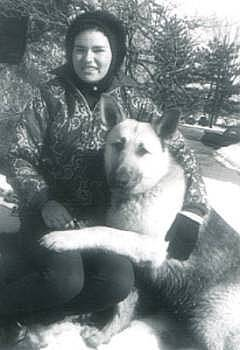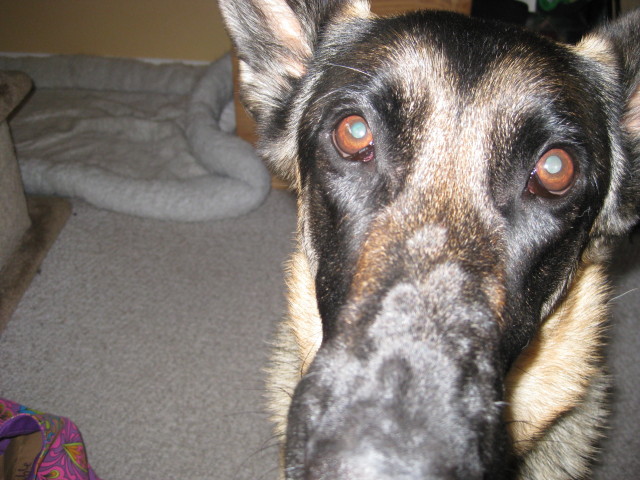QuestionMy 2 year-old lab recently began coughing up white foamy stuff in the mornings; scratching his face, shaking his head a lot, and biting his paws. I thought he must be allergic to something; i have taken him to the vet 3x; they gave me hydrocodone for his cough which did nothing. Then they gave him a seroid shot and for 3 days he was great. Then he began coughing and scratching again. They took a chest x-ray and that was fine and he has no fluid in his lungs. THen they gave him a med that has prednisone and something for cough too which helps some - no cough now but he is still scratching. What could this be? Thanks!
AnswerHi,
I am sorry for the delay in answering your questions. I have been focused on helping with the rescue efforts after the hurricane.
The first thing I would want to address is vaccinations! Vets have been over vaccinating which can cause allergies and auto immune disease. What is the relationship between when your dog was last vaccinated and the start of his symptoms? Even if the vaccinations didn't directly cause this problem, I would refrain from vaccinating except for a three year rabies shot. Go to the following page and follow the links:
http://www.google.com/search?hl=en&ie=ISO-8859-1&q=vaccinations%2C+dogs%2C+dange...
From your description, I can say without reservation, that your precious Lab is suffering from allergies. It is likely the food he is eating but you would want to explore all the cleaning agents you use, the lawn care products, new carpets, etc. I personally only use Dr. Bronners and vinegar to clean with. In the bathroom I use a small amount of chlorox and then clean over that with Dr. Bronners.
Addressing the food and food allergies:
Food May Be the Cause of Your Dog's Skin Problems.
Food allergies or sensitivities are usually the last suspect in detecting the cause of a dog's skin problems. Most dogs are fed the same type of dog food for years, so the food is rarely suspected. Dogs, like humans, can develop a sensitivity to any food or additive at any time.
According to Jeff Wayman, DVM, it is estimated that 10 to 15 percent of all allergic skin diseases in dogs and cats is caused by food allergy.
Common Ingredients
Dog food is made up of a combination of ingredients. The most common ingredients that can cause problems in a dog include:
beef
chicken
corn
eggs
fish
lamb
milk
preservatives
pork
soy
wheat
whey
Symptoms
Itchy skin is the primary symptom a dog suffers from food sensitivities. Other symptoms may include:
anal itching
ear inflammations
hair loss
licking front paws
loss of appetite
face rubbing
head shaking
These following symptoms may manifest but are rare:
asthma like symptoms
behavioral changes
diarrhea
flatulence
seizures
sneezing
vomiting
Steps of Prevention
Be sure to eliminate all the foods in the dog's diet that match the list above, and feed your dog a commericial or homemade diet consisting of ingredients the dog has never eaten before.
The homemade diet should consist of two parts starch and one part protein. Although duck, salmon, soy, venison, and rabbit are suggested for the protein; and rice and potatoes for the starch; soy and rice are not always safe substitutes.
The Mar Vista Animal Medical Center generally recommends duck and potato based foods for dogs.
You may be able to select a special commercial dog food blend that suits your dog's needs.
Whatever diet you choose for your dog, it should be the only food the dog ingests during the elimination period.
This means no table scraps, dog biscuits, dog bones, rawhide chews, vitamins, minerals or chewable heartworm pills.This elimination diet is only temporary and once you find out what your dog is allergic to you must start to add other ingredients to make a complete meal for your dog.
If symptoms begin to improve during the elimination period, you can then reintroduce each of the eliminated food items one at a time. Each food should be tested for a week before another is introduced. This will allow you to pinpoint which foods may be causing problems if symptoms resurface.
Once the offensive food is discovered, then reading dog food labels should help you pinpoint a food that meets the needs of your dog. Although there are many hypoallergenic dog foods on the market, be sure to read the labels carefully. Foods like Solid Gold Fish and Potato might work wonders for your dog. You can also try Spot's Stew, Avoderm, Venison, Rabbit, Paul Newman etc, or continue to make your own food at home. At least that way the food is fresh and you know what has gone into it. A helpful book is Natural Health for Dogs and Cats by Dr. Pitcairn.
There is a site on dog health which includes great information about allergies and the best way to feed your dog. I urge you to spend some time studying the information that this wonderful site has to offer.
http://www.shirleys-wellness-cafe.com/animals.htm
The best of luck with your dog's health. Once you find the cause of the problem, your dog will be feeling health and chipper again.
Keep in touch and let me know how he is doing.
Regards,
Shelley Davis
www.bednbiscuit.com

 willpups hair grow back to original color
Question
here is his color befo here is after &nb
willpups hair grow back to original color
Question
here is his color befo here is after &nb
 Delayed German Shepherd Heat
QuestionMy German Shepherd
QUESTION: I have a Ge
Delayed German Shepherd Heat
QuestionMy German Shepherd
QUESTION: I have a Ge
 What dog is right for me?
QuestionHi,
my name is Miriam and I am 12 years old.
What dog is right for me?
QuestionHi,
my name is Miriam and I am 12 years old.
 bumps on dogs nose
Question
bumps on nose
My dog has bumps on her nose..Sh
bumps on dogs nose
Question
bumps on nose
My dog has bumps on her nose..Sh
 Rescued Shiba with ISSUES
Question
Shredder
Kristin,
I consider myself an experie
Rescued Shiba with ISSUES
Question
Shredder
Kristin,
I consider myself an experie